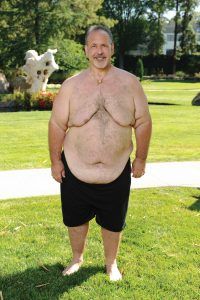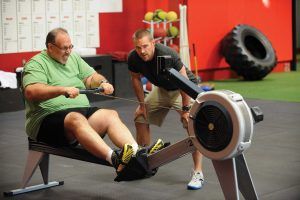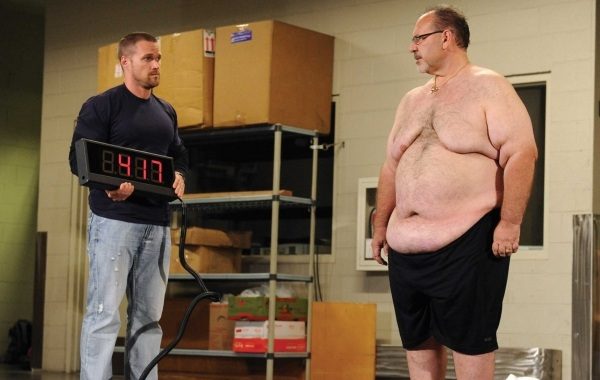 Mike Epstein calls it the walk of shame. He was sitting in a roller coaster at Great Adventure with his son when the safety bars wouldn’t lower and lock. It took a minute for Epstein to realize they weren’t lowering because of him. He was morbidly obese, and the bars didn’t fit over him. He and his teenage son were asked to get off the ride.
Mike Epstein calls it the walk of shame. He was sitting in a roller coaster at Great Adventure with his son when the safety bars wouldn’t lower and lock. It took a minute for Epstein to realize they weren’t lowering because of him. He was morbidly obese, and the bars didn’t fit over him. He and his teenage son were asked to get off the ride.
“It was the kind of ride where the bars were all connected, so if one didn’t close, none of them did. We had to walk past everyone sitting on the roller coaster,” he says. “It was just awful. My kids don’t deserve to be embarrassed because of me.”
Epstein, 50, says his family was the motivation that landed him on ABC’s reality program “Extreme Weight Loss.” In the show, contestants agree to work with a trainer/coach for one year to lose half their body weight. Epstein is done filming his episode – and losing his weight. He started the show at 417 pounds, but can’t reveal how much he’s lost until the show airs.
Epstein, who lives in Voorhees with his wife and three children (Ethan, 18; Gabby, 15; and Aidan, 10), says his kids have only known him as morbidly obese. “I always felt I was taking away from my kids. I was a good dad emotionally, but I was never there for them physically because I had limitations. There were many things I couldn’t do with them.
“Being morbidly obese is shortening your life,” he adds, “and I didn’t think that was fair to my family. If I did live longer and had a medical problem that caused me to be a burden to my family, that would hurt me more than anything else. That is what drove me through this entire process.”
Epstein responded to a casting call in Philadelphia, met with producers, videotaped himself and his family at home, underwent medical and psychological testing, and eventually learned he had made the show. It’s reasonable to have such a lengthy review process, Epstein says, because he was preparing for the greatest challenge of his life.
During the year-long transformation (from April 2012 to April 2013), Epstein worked with the show’s fitness expert and host Chris Powell; Chris’ wife Heidi Powell, who is a life coach; and an SJ fitness trainer, who worked with him here when the Powells were back in L.A. He spent three to four hours in the gym six days a week, focusing primarily on cardio to burn fat. He also made drastic changes to his diet, eating every three hours and limiting his intake to about 2,000 calories a day.
“I try to have my carbs earlier in the day, and I also eat processed foods as little as possible. Nothing white: no white sugar, white flour, and I don’t eat white rice. I eat good carbs. I eat yams, I eat brown rice, fruit, a lot of proteins and a lot of vegetables.”
He was weighed for the show’s cameras every three months, but he weighed himself once a week. “I wanted to make sure I was on track or to see if I needed to contact Chris for any modifications if I hit a plateau. When Chris wasn’t with me in person, he was working with me and my at-home trainer to tweak my program for optimum results.”
 Along with the physical conditioning, Epstein says he received a great deal of benefit from visits with a therapist, which the show required.
Along with the physical conditioning, Epstein says he received a great deal of benefit from visits with a therapist, which the show required.
“I was able to identify that I’m an emotional eater,” he says. “I’m a late-night eater, and I had to address those things, understand them, recognize what a trigger food is and how to deal with one. I came to understand there were a lot of events that occurred in my life, but it wasn’t the event that caused me to gain weight. It was how I dealt with the event.”
Epstein speaks of a time during his childhood when he wanted to rebel against his mother, a Weight Watchers consultant who preached healthy eating to her family. “I didn’t realize she did this because of her love and concern for us; she wanted to make sure we lived a healthy life,” he says. “I wound up closet eating. At 12 years old, I was 200 pounds.”
By the time Epstein attended Cherry Hill High School West, he realized the wisdom of his mother’s teachings and turned that 200 pounds to primarily muscle, landing a spot on the school’s football team. He excelled at the sport and went on to play in college. As a lineman, he was encouraged to eat as much as possible to keep weight on.
“Unfortunately, when I graduated, I kept the same eating habits and wasn’t exercising. Stress became part of my life. I got married, had kids, started a business and, ultimately, my father passed away. The way I dealt with all that was to turn to food for comfort. I gained 150 pounds in the year after my dad died.
“Eating food brought me comfort even though I felt terrible after. I just felt like a bottomless pit. I was never satisfied. Before, I would stop somewhere on my way home from work and get a sandwich or a piece of pizza, and I knew I’d be having dinner when I got home. That was just part of my terrible habits that built up over time. It became part of my life.”
Over the years, Epstein repeatedly tried to lose the weight. “I’m the perfect yo-yo dieter. I’ve been on every diet. I can teach you every diet. I know everything there is to know about diets,” he says.
“I have lost weight before, but I’ve never lost as much as this time. This was different. One of the things that’s really important to understand is when you’re on a diet, you need to start with your mind, not with your body. I think that’s one of the biggest things I learned over the course of the year. Once you get your mind straight, your body’s going to follow. Your body losing weight and getting into good shape is really just a byproduct. It’s changing what’s in your mind that’s the real challenge and the real success.”
Now Epstein is faced with keeping off the weight, which he knows could be as difficult as losing it. He has developed a routine of going to the gym for one hour six days a week and sticks to his diet restrictions. He allows himself one reward day where he loosens those dietary restrictions a bit.
“On a reward day or at a reward meal over a couple days, I eat whatever I want. I will eat pizza, a cheesesteak, a piece of cake or chips – whatever I want, taking in an extra 1,000 to 1,500 calories. One thing you don’t want to do is focus on food all the time because you don’t eat it. Then, that’s all you’ll think about. But staying strict makes me look forward to my reward meal or my reward day. I try to be flexible, but I always try to stay mindful.
“Maintaining is definitely a worry and a concern,” he says. “Losing the weight is really only half the battle. It’s finding the new normal and being satisfied with myself. But finding my new normal is actually fun.”
That struggle to accept the new normal affects Epstein almost every day. In the past, if he was going out to dinner, he would call the restaurant beforehand to be sure he’d be seated at a table – not a booth – and have a chair with no arms because of his size. Those concerns still creep into his mind.
“I used to be scared to death to go to a new restaurant, because I didn’t want to be put into a situation where I embarrassed the people I was with. I’ve had situations where I’ve had the hardest time sitting in a booth, or they had to put a chair at the end of the booth so I could sit with everybody,” he says. “I still have that kind of thought process where I want to call ahead, and my wife will nudge me and say, ‘You don’t have to do that anymore.’
“I also had to worry about flying in an airplane – if there would be a problem with the seatbelt extender or I would get a middle seat. The last flight I just went on I got a last-minute ticket and only middle seats were left, and I was still nervous. I forget I don’t have to be. I can look in the mirror and see a different person, but sometimes I see the old me. My therapist said it takes three to five years before your mind catches up to your body.”
But Epstein can’t dispute the difference in his body when he goes clothes shopping. “Buying clothes is the most wonderful experience in the world right now. Before there was only one place I could buy clothes, and for some reason, these places like to put a lot of prints on giant shirts and pants. They’re not very attractive. Now I can go anywhere, buy anything off the rack, and feel comfortable and confident.”
What gives Epstein the most pleasure these days is being a role model for other people who are struggling with their weight. “I didn’t realize I was an inspiration for people I didn’t even know who were working out at my gym. I love seeing their success. I love seeing the smiles on their faces, and I know their families have to be happy. So part of my going forward is to be able to pay it forward, because I’ve been given the opportunity of a lifetime. This was like winning the lottery.”














